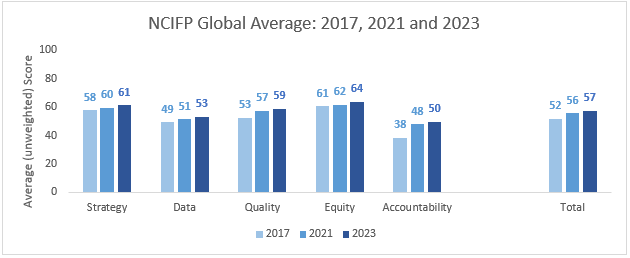The National Composite Index on Family Planning (NCIFP) is a new tool developed to support FP2020's efforts to improve the enabling environment for family planning. It measures both the existence of family planning policies and program implementation, using 35 individual scores organized under five dimensions: strategy, data, quality, equity, and accountability.
- Strategy: What plans are in place? Do they include important elements (e.g. quantified objectives, focus on vulnerable populations, etc)? Is there Government support for FP?
- Data: Focused on both data collection (service statistics, monitoring sub-groups, etc), and data use to inform decisions.
- Quality: Do services meet WHO standards? Are quality of care indicators monitored? Are there structures in place to support quality services?
- Accountability: Focused on monitoring and addressing issues related to coercion and denial of services and ensuring voluntarism and informed choice.
- Equity: Focused on issues related to policies and programmatic issues related to discrimination, efforts to reach under-served groups, and wide-spread access to FP methods.
First undertaken in 2014, the NCIFP built on the long-standing National Family Planning Effort Index (FPE). A second round of data collection was conducted in 2017 to assess current national FP program status and changes since 2014. The data are intended for policy and planning use by each country's FP stakeholders.
The NCIFP provides new and innovative data about key areas that are important to family planning, but, have not been well measured in the past. It represents an important step in pushing forward the FP measurement agenda.
FP2020's Performance Monitoring & Evidence (PME) and Rights & Empowerment (RE) Working Groups provided oversight and technical guidance for the development of the NCIFP. Avenir Health's Track20 Project led the data analysis. Results from the NCIFP's battery of 69 questions and select questions from the FPE were analyzed, and, after several iterations, a final set of 35 items was chosen to comprise the NCIFP scores.

The total score for the NCIFP is the average of the 35 individual scores for each country. The overall 2023 score, averaged across all countries (unweighted) is 57 (out of a possible 100). This is up from the 2017 overall score of 52 and the 2021 overall score of 56.
Looking at the five dimensions there was some variability, but less than was seen in 2017. Equity continues to be the highest scoring dimension (64), and Accountability remains the lowest (50). Increases from 2021 to 2023 were modest across all dimensions, ranging from +1 point for Strategy to +2 for the other four dimensions.
The NCIFP presents an opportunity for countries to engage in discussion around important issues related to strategy, data use, quality, equity and accountability. By looking through the aggregate and individual scores and benchmarking performance against other countries or regional averages the data can be used to highlight successes, and, areas that may require attention.